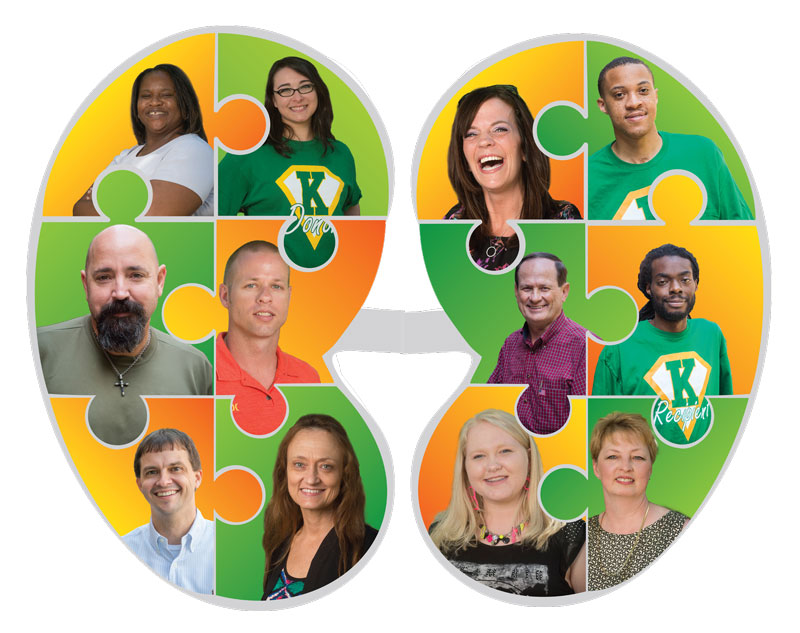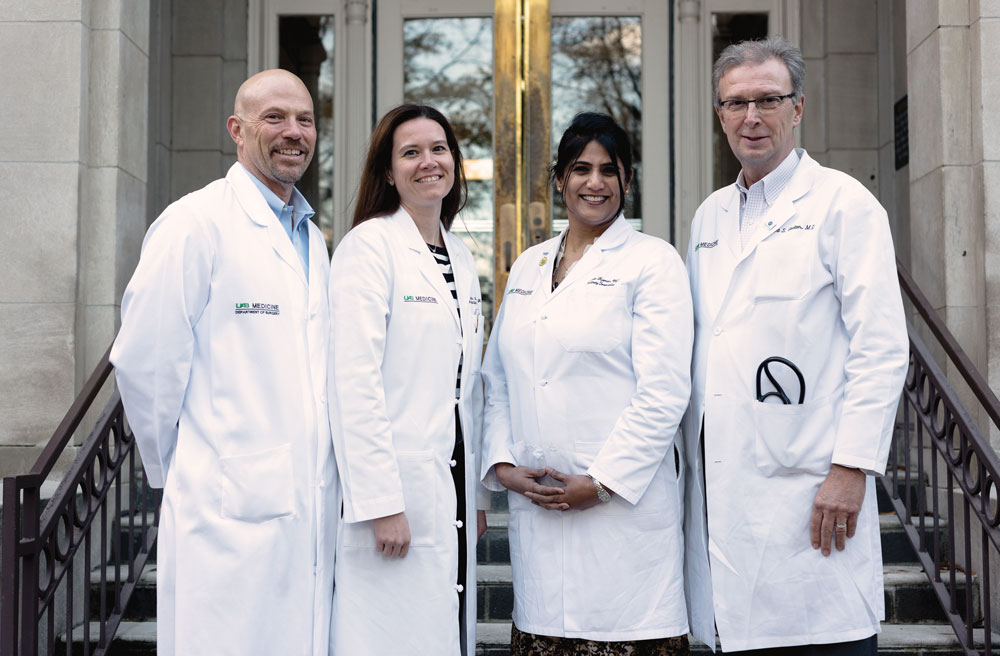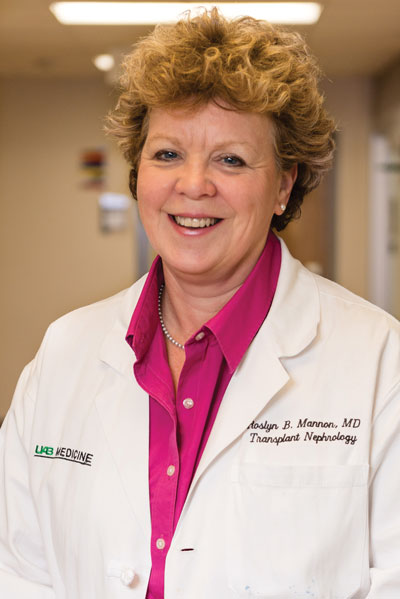 Right now, more than 100,000 Americans are waiting for a kidney. Of them, about 3,600 are here in Alabama—the second longest waiting list in the country. Few options are available for those on the wait-list, and many will die before a suitable kidney becomes available.
Right now, more than 100,000 Americans are waiting for a kidney. Of them, about 3,600 are here in Alabama—the second longest waiting list in the country. Few options are available for those on the wait-list, and many will die before a suitable kidney becomes available.Kidneys from living donors often provide better and longer lasting outcomes than deceased donor transplants. Traditionally, a friend or family member volunteers to donate a kidney to a specific recipient. However, due to differences between blood types or cell/tissue marker proteins called human leukocyte antigens (HLA), only about 50 percent of suitable living donor candidates are compatible with their intended recipients.
“If you look at blood group frequencies, about 35 percent of donors will be incompatible with their intended recipient based on blood group,” says Jayme E. Locke, M.D., M.P.H., director of UAB’s Incompatible Kidney Transplant Program. “Another 11 percent will be incompatible based on tissue. With traditional means of transplantation, they will not be able to give directly to that individual.”
To make more kidneys available for more patients, doctors at UAB are developing new ways to increase the number of living donors via the Incompatible Kidney Transplant Program. This innovative effort facilitates previously unperformable transplants by either treating the blood or tissue incompatibility (desensitization), or by finding a different compatible living donor (kidney paired donation). It is the only program of its kind in the Southeast.
Transplant innovations aren’t new to UAB—in fact, UAB performed its first kidney transplant almost 50 years ago. “We’ve now performed more than 9,000 transplants,” says Robert S. Gaston, M.D., the Robert G. Luke, M.D., Endowed Chair in Transplant Nephrology and co-director of the UAB Comprehensive Transplant Institute. “Only one other place in the country has performed more transplants than we have.”
Recently, UAB’s transplant program has earned some highly visible accolades. The UAB Kidney Chain, a variant of kidney paired donation (KPD), has become the longest kidney transplant chain ever at a single site, giving 34 people so far a new lease on life. The Kidney Chain was featured on ABC News’ “Nightline” last July. The second notable initiative, a seven-year, $17 million multicenter study funded by the National Institutes of Health, aims to help transplant recipients’ kidneys remain healthy for longer.
Give and Take: UAB Kidney Chain
UAB’s program in kidney paired donation was developed to promote access to lifegiving transplants for more people in need. In such a program, a transplant candidate becomes eligible to receive a kidney if a family member or friend volunteers to donate a kidney to another patient. Doctors, nurses, and staff work to find the best possible match for each patient out of the pool of willing donors. Devin E. Eckhoff, M.D., Jayme E. Locke, M.D., M.P.H., Vineeta Kumar, M.D., Robert S. Gaston, M.D. “It all started when one altruistic donor came forward who wanted to donate a kidney,” says Vineeta Kumar, M.D., program director for the Transplant Nephrology Fellowship Program and medical lead for the Incompatible Kidney Transplant Program. “She was able to give to a recipient, which freed up that person’s donor to give to another recipient, and then it’s a matter of getting creative.”
Devin E. Eckhoff, M.D., Jayme E. Locke, M.D., M.P.H., Vineeta Kumar, M.D., Robert S. Gaston, M.D. “It all started when one altruistic donor came forward who wanted to donate a kidney,” says Vineeta Kumar, M.D., program director for the Transplant Nephrology Fellowship Program and medical lead for the Incompatible Kidney Transplant Program. “She was able to give to a recipient, which freed up that person’s donor to give to another recipient, and then it’s a matter of getting creative.”For some patients, creative solutions are the only way they can receive a kidney. Many of these individuals have such high concentrations of antibodies in their blood stream that they’re incompatible with almost every potential donor. In cases such as these, the transplant surgery is preceded by desensitization treatments, which remove harmful antibodies from the blood stream with immunosuppressant drugs.
If a more compatible donor can be found, the recipient will require less intense immunosuppression and the likelihood that the kidney will be rejected also decreases. “The kidney chain offers transplants to people who potentially wouldn’t have gotten them before,” says Devin E. Eckhoff, M.D., the Arnold G. Diethelm Endowed Chair for Transplantation Surgery and co-director of the UAB Comprehensive Transplant Institute.
The positive outcomes and patients’ reactions are what keep the doctors working through the setbacks. “It’s like happy medicine,” says Eckhoff. “You take people who are sick and dealing with chronic illnesses. When they get a new organ, they get a new lease on life.”
According to the Kidney Chain team, this same strategy could be expanded to encompass the entire country. “If we could do this nationally, we could optimize living kidney donation in this country in a way that we have never been able to do before,” says Locke. “I think we can actually begin to make a significant dent in our waiting list.”
NIH Multicenter Grant
If it comes from a living donor, a new kidney will work for an average of 15 to 20 years. Another part of UAB’s multifaceted approach to patient care is finding ways to extend the life of transplanted organs. In collaboration with the University of California San Francisco (UCSF) and Emory University, UAB has received a seven-year, $17 million grant funded by the National Institutes of Health to research novel ways to reduce or eliminate inflammation in kidney transplants. Roslyn B. Mannon, M.D.Through this study, physicians will explore different treatments for people who recently underwent transplant, says Roslyn B. Mannon, M.D., professor in the Divisions of Nephrology and Transplantation and director of research in the UAB Comprehensive Transplant Institute. “We’re trying to see if we can impact patients over the long-term.”
Roslyn B. Mannon, M.D.Through this study, physicians will explore different treatments for people who recently underwent transplant, says Roslyn B. Mannon, M.D., professor in the Divisions of Nephrology and Transplantation and director of research in the UAB Comprehensive Transplant Institute. “We’re trying to see if we can impact patients over the long-term.” To do so, the team is researching novel anti-inflammatory agents. One such approach is called adoptive cellular therapy. In this treatment, a type of white blood cells called regulatory t-cells, which suppress the activity of other immune cells, will be used to try to suppress specific immune responses.
The other part of the project will examine the use of a rheumatoid arthritis drug called tocilizumab. Tocilizumab is an immunosuppressive drug that works by blocking interleukin 6 (IL-6) receptors. In this particular study, researchers will look at noninvasive markers of inflammation as well as outcomes to see if they can develop ways of monitoring patients more sensitively so physicians can better predict how patients will do after the transplant.
UAB became part of this grant in part because of its previous collaborations with UCSF and Emory and also because of the diversity of the population it serves, says Mannon. In addition, UAB’s long history with kidney transplantation means that it has the infrastructure to support new initiatives.
Moreover, with the recent emphasis on precision medicine, Mannon, in collaboration with Nita Limdi, Pharm.D., Ph.D., interim director of the Hugh Kaul Personalized Medicine Institute, submitted a multicenter collaborative study on the impact of genes on responses to immunosuppression. “With this new grant, along with other novel interventions, we are launching into a new era of personalized medicine,” says Gaston. “Our reputation and experience, coupled with the hard work of all our physicians and surgeons, will keep us at the forefront of innovation in transplantation.”
Even after the grant ends, UAB physicians and researchers will continue to develop and refine techniques to increase the number of transplants they perform every year. By doing so, they’ll be better able to optimize these precious resources. In Eckhoff’s words, “We’ve got to make the best use of every gift we have.”